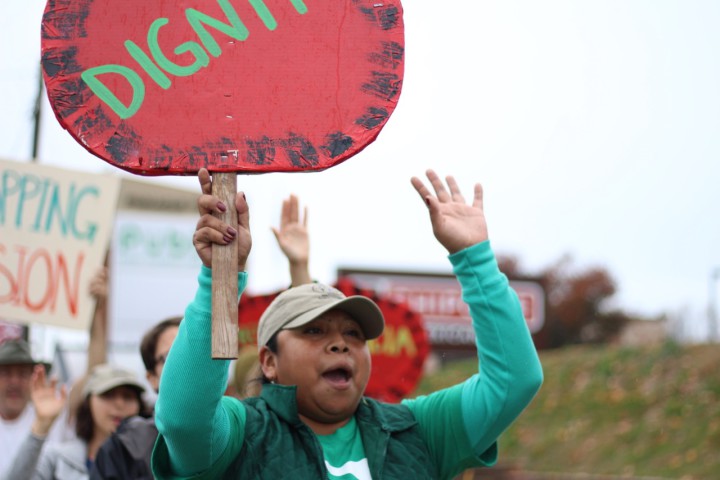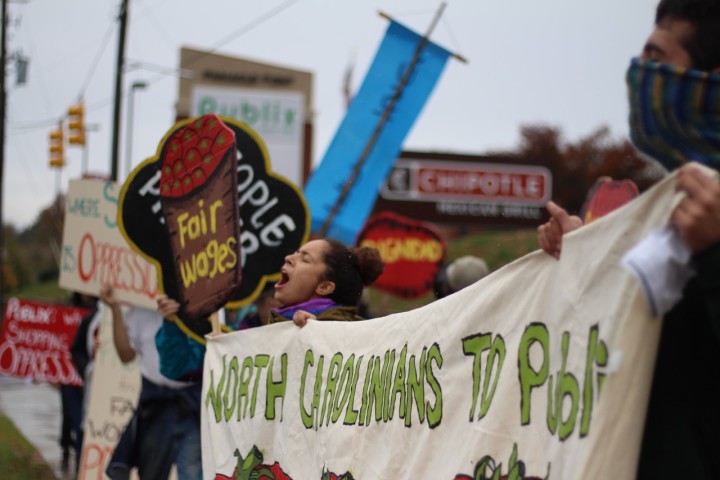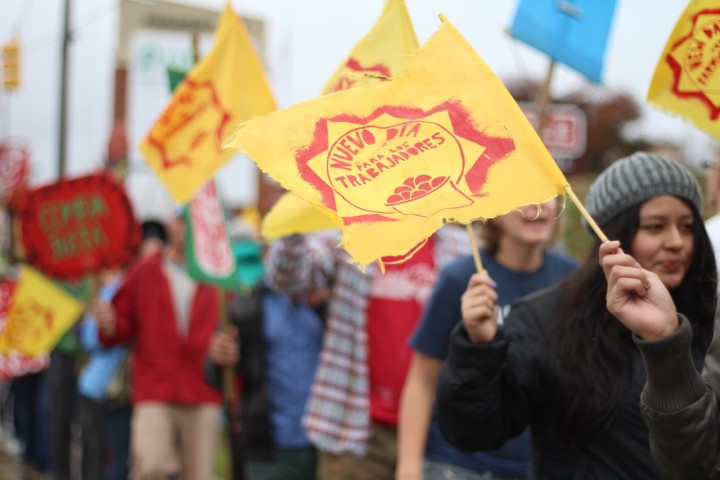Farm workers from the Florida-based labor rights organization the Coalition of Immokalee Workers joined people from the Asheville area in picketing the Publix grocery store at Pinnacle Point on Hendersonville Road on Sunday, Nov. 1. The protestors were asking the Florida-based supermarket to support human rights for agriculture workers in its supply chain by joining the CIW’s Fair Food Program. The program is a partnership among farmworkers, Florida tomato growers and tomato retailers (including McDonald’s and Walmart) that addresses “decades-old farm labor abuses at the heart of the nation’s trillion-dollar food industry,” according to a press release.
“Despite the afternoon rain, dozens of community members came out to make it a lively picket,” says Claire Comiskey, representative of the Alliance for Fair Food, a social responsibility network that partners with the CIW. Members of Beth Israel Congregation, Vecinos farm worker health program and other local community groups joined students from UNC Asheville, Warren Wilson College and Brevard College at the picket line, says Comiskey.
Stores that participate in the Fair Food Program require humane labor standards from their tomato suppliers and pay one penny more per pound to improve workers’ pay. They also agree to buy only from tomato growers that are part of the program. Human rights considerations addressed by the program include providing required shade and water and other critical health and safety protections, plus and a zero-tolerance policy for slavery and sexual violence.
Publix issued the following statement to Xpress in response to the protest:
We have always believed our food should be brought to market in a fair and sustainable way, and that farmworkers should receive fair wages and be treated with dignity and respect. The CIW’s Fair Food campaign makes it sound like Publix is unwilling to pay a penny more per pound of tomatoes, which is not true. We have publicly and repeatedly offered to pay the extra penny per pound and more. To give workers better wages, we will gladly pay more for tomatoes if our suppliers will put that penny in the price they charge to us. However, it is not appropriate for Publix to pay another company’s workers directly. At its core, this is a labor dispute. It is the Department of Labor’s role to enforce the laws that protect workers’ rights.
Click here to read more about Publix’s position on the CIW Fair Food Program.
The Nov. 1 picket was part of the CIW’s North Carolina Publix Truth Tour, which also presented a free screening of the documentary film Food Chains at the Carolina Cinema on Thursday, Oct. 29. Members of the CIW also staged a protest at the Hendersonville Road Publix on May 2, shortly after the store’s grand opening.
Following are photos from the picket provided by the Coalition of Immokalee Workers:
- FAIR FOOD: Members of the Florida-based Coalition for Immokalee Workers picketed the South Asheville Publix supermarket on Sunday. Protestors were asking the grocer for a commitment to supporting labor rights within its supply chain.
This press release from the Alliance for Fair Food sent in advance of the protest provides additional information about the Coalition of Immokalee Workers and the Fair Food Program:
Asheville, NC — Sunday, November 1, at 2 pm, scores of Asheville area community members will gather with farmworkers of the internationally-recognized the Coalition of Immokalee Workers (CIW) for a protest at the Publix at Pinnacle Point. They will demand that the Florida-based grocer support the human rights of farmworkers by joining the CIW’s internationally-recognized Fair Food Program, a groundbreaking collaboration that has won the praise of human rights observers from the White House to the United Nations for its unique success in addressing decades-old farm labor abuses at the heart of the nation’s trillion-dollar food industry. Since Publix began expanding their stores into North Carolina, members of the Asheville community have been demanding that Publix end its six-year refusal to be part of this transformative solution to decades of farmworker exploitation, most recently holding a lively picket outside of the grand opening of the store in April. This Sunday’s protest comes a few days after Thursday’s free screening of the film “Food Chains” at The Carolina Cinema Asheville, which focuses on the work of the CIW, exploring the exploitation of farm workers in the agriculture industry in the United States, the complicity of corporations in perpetuating human rights abuses, and the role consumers can play in working for justice.
What: Large and lively picket at Publix
When: Sunday, November 1, at 2 pm
Where: Outside of the Publix at Pinnacle Point, 1830 Hendersonville Road, Asheville
Why: Farmworkers and consumers will call on Publix to join the Fair Food Program, a social responsibility program to ensure respect for basic human rights for farmworkers in its tomato supply chain.After decades, the CIW has fundamentally transformed the Florida tomato industry through the Fair Food Program (FFP), an historic partnership among farmworkers, Florida tomato growers, and 14 multibillion dollar tomato retailers, such as McDonald’s and Walmart. This past summer, the Fair Food Program began to expand into tomato fields up the east coast through New Jersey, including North Carolina. Participating companies require more humane labor standards from their tomato suppliers and pay one penny more per pound to improve workers’ pay, agreeing to buy only from tomato growers that are part of the Program. The FFP is ensuring human rights protections for tens of thousands of farmworkers, including required shade and water, other critical health and safety protections, and a zero tolerance policy for slavery and sexual violence. Since 2011, nearly $20 million has been distributed to farmworkers’ paychecks through the penny-per-pound premium. The Fair Food Program was heralded in the New York Times as “the best workplace monitoring program … in the US” and “one of the great human rights success stories of our day” in the Washington Post.
“As farmworkers, we are enjoying the incredible human rights advances that the Fair Food Program has made in agriculture — just this summer, these rights expanded beyond Florida into North Carolina. At the same time, Publix is opening stores here while denying their responsibility to respect the human rights of farmworkers in their supply chain,” said Santiago Perez, member of the Coalition of Immokalee Workers. “We’re going to continue building with the people of Asheville to bring our message to Publix: that they cannot continue to expand their stores without expanding their commitment to human rights.”
“As an Asheville resident and local business owner, I and many others will not welcome Publix as a neighborhood grocer until they respect the human rights of their neighbors in Florida — the farmworkers in their supply chain,” said Ian Rudick, member of the Asheville Grown Business Alliance and Asheville Chamber of Commerce.








I wonder if Ian Rudick has checked his local Walmart or Sams to see if their tomatoes come from Mexico? So far I haven’t been able to find any that don’t come from Mexico. Are the Mexican tomato workers covered by this arrangement?
Perfect point. I was in Wal-Mart last week all the tomatoes were from Mexico.
A. the agreement says that they will agree only to buy from farms on the program……
B. Who is checking on compliance for companies that sign up?
C. Look’s like Publix agrees with the concept, simply have the suppliers bill them for the penny, or more .
It’s not really about a penny a pound, but about unionization, power, influence and control. If successful, it will only be the beginning. This is not the only place where this sort of thing is happening. It takes various forms, but the objective is the same. It’s not whether Walmart actually conforms to the agreement. It’s about the power and influence the agreement provides when going after everyone else.